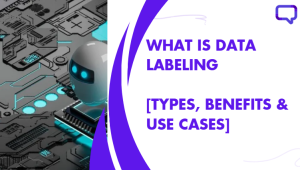
Table of Contents
Chatbots are the newest trend in customer service, as several large companies have started using them to answer basic questions about their products and services.
You must’ve used them as well without realizing because they’re getting smarter and sound almost like a human being.
But does this really make sense from the consumer’s point of view?
Some experts think that chatbots are a great way to deliver value efficiently.
Others believe that they take away the human element from the customer service experience.
That creates an impersonal environment where you never get to speak with a human being.
This article discusses both sides of the debate and offers advice on how you can decide if chatbots are suitable for your business or not.
50 Latest Chatbot Statistics in 2023
What are Chatbots
Chatbots are like little digital buddies – they are computer programs based on algorithms that mimic human conversations.
They work by recognizing certain parts of text, such as keywords and phrases, and send out pre-set responses.
The more advanced models of chatbots that are coming in work based on machine learning.
Machine learning is when a computer program learns and gets smarter based on its interactions with humans.
Chatbots are popping up in various industries, from retail and banking to healthcare and education.
They’re helping businesses answer customer queries, offer product recommendations, guide users through processes, and much more.
But, while they offer many benefits, their widespread adoption has sparked an intriguing discussion.
Do consumers genuinely appreciate these digital assistants, or do they see them as impersonal and frustrating? Let’s explore this debate further in the following sections.
Market Overview
Chatbots have witnessed a remarkable rise in recent years.
As per a report by Grand View Research, the global chatbot market size was valued at $2.6 billion in 2019 and is expected to grow at a compound annual growth rate (CAGR) of 24.3% from 2020 to 2027.
Businesses are increasingly adopting these digital assistants for their round-the-clock availability, instant responses, and the ability to handle multiple customer interactions simultaneously.
For instance, the banking industry has seen a significant uptake, with Juniper Research predicting that chatbots will be responsible for cost savings of over $7 billion annually by 2024.
This means that the chatbot market is going to keep expanding with time
Chatbot Pros – The Case For Chatbots
There’s no denying the benefits that chatbots bring to the table.
Chatbots offer businesses a cost-effective and efficient solution to provide 24/7 customer support.
A study by IBM suggests that chatbots can answer 80% of standard questions, thus freeing up human resources for more complex tasks.
They also contribute to improved customer satisfaction, with Invesp reporting that 67% of consumers worldwide used a chatbot for customer support in the past year and were largely satisfied with their experiences.
According to Chatbots Magazine, businesses can reduce customer service costs by up to 30% by implementing conversational solutions like chatbots.
Improved Efficiency and Productivity
Chatbots can handle multiple conversations at the same time, something a human agent can’t do.
This means fewer customers are left waiting for a response, leading to a more efficient customer service process.
A report by Salesforce indicates that chatbots can increase operational efficiency by over 27%.
Furthermore, by automating routine tasks, chatbots free up time for human agents to focus on more complex customer inquiries.
This not only reduces the workload but also enables better utilization of the human workforce, leading to improved productivity.
Enhanced Customer Experience
In today’s fast-paced world, customers expect quick and accurate responses.
Chatbots can deliver instant replies to customer queries, thereby increasing customer satisfaction.
A survey by LivePerson found that 38% of consumers had a positive perception of chatbots, mainly due to their speed and availability.
Additionally, chatbots can offer a more personalized experience by analyzing user data and preferences to deliver tailored recommendations and solutions. This level of personalization can significantly enhance the customer experience and boost brand loyalty.
Scalability
Unlike human agents, chatbots can be easily scaled during peak times without compromising the quality of customer service.
Whether a business needs to handle 100 or 10,000 customer queries, chatbots can be programmed to manage the increased demand seamlessly.
Data Collection and Analysis
Chatbots can also play a significant role in collecting and analyzing customer data.
They can track user interactions, record buying patterns, and monitor user behavior, providing businesses with valuable insights to improve their services, products, and overall customer strategy.
Hire Live Chat Agents For Your Business
Chatbot Cons – The Case Against Chatbots
However, not all experiences with chatbots are positive.
Despite their increasing sophistication, chatbots often fall short of handling complicated or nuanced conversations.
A survey conducted by CGS revealed that 51% of consumers stated that chatbots keep them from reaching a live agent and have limited functionality.
Moreover, concerns over data privacy and lack of personal touch also add to consumer hesitations about using chatbots.
Lack of Human Touch
Although AI has progressed significantly, chatbots can still lack the human touch in communication. They can’t comprehend the nuances of human emotions completely, which might be essential in some industries like mental health or customer service.
Limited Understanding and Responses
Chatbots are limited to the data and programming they’ve been given. If a customer has a unique problem or uses unusual phrasing, the chatbot might not understand and therefore might not provide the correct information or assistance.
Impersonal Interaction
Some customers find interacting with chatbots to be impersonal. They might prefer speaking to a human who can empathize with their problem or understand their situation on a deeper level.
Dependency on Technology
Chatbots are fully dependent on technology, and they can fail or face downtime due to technical issues. This can interrupt the user experience and potentially lead to lost sales or unhappy customers.
Privacy Concerns
Chatbots can be a risk when it comes to sensitive information. If not adequately secured, they can be hacked, potentially compromising the user’s data.
The Consumer Perspective
The consumer sentiment towards chatbots seems to be a mixed bag.
On one hand, the younger demographic seems more open to chatbot interactions, with 60% of millennials reporting positive experiences with chatbots according to Mobile Marketer.
On the other hand, a PwC survey found that 59% of all consumers feel companies have lost touch with the human element by focusing too much on digital interactions.
Thus, while consumers appreciate the convenience and efficiency of chatbots, they also value human interaction, especially when it comes to dealing with more complex issues.
These statistics and perspectives highlight the crux of the chatbot debate.
As we venture into the next sections, let’s delve into potential future developments and predictions for chatbots, shaping both their capabilities and our interactions with them.
While there’s a robust debate surrounding chatbot usage, the advantages they provide to businesses are hard to overlook.
Is it Too Early to Start Using Chatbots in Marketing Campaigns?
Chatbots may be cool—but do consumers really want them in their day-to-day lives?
The consensus among industry experts is that chatbots have a lot of potentials, but it’s too early to say if chatbots are a fit for marketers.
Chatbots could prove very useful in automating responses.
Still, until they develop an intelligence level similar to that of humans, chatbots are better at creating engaging conversations than doing anything productive on their own.
Chatbots have a variety of potential uses.
Marketers could use chatbots to build customer loyalty, run loyalty programs, show up on social media, chat with consumers about their latest products, or host online contests for engaged customers.
Today, chatbots are being incorporated into marketing strategies, but it’s too early to tell if they’ll be a worthwhile investment or simply a passing fad.
At present, chatbots in marketing campaigns are mostly limited to fun and engaging applications like interactive games and customer service FAQs—valuable services that help consumers interact with brands.
For chatbots to develop into an instrumental part of online marketing strategies, they’ll need to evolve far beyond simple interactive conversations.
How Successful Have Companies Been so Far With Their use of Chatbots?
These days, you don’t need to go far before you hear about companies using chatbots in their marketing strategy.
So, how successful have companies been so far with their use of chatbots?
In cases, chatbots have failed miserably. Over 70 percent of consumers in one survey said they’d opt for human-to-human contact instead of artificial intelligence.
These varying degrees of success may point to a broader trend.
Just as social media helped drive e-commerce, chatbots may follow a similar pattern by enabling drive AI-based commerce.
More than 50 percent of consumers believe that they’ll make most of their purchases online in five years.
Should we be Using Voice Assistants like Amazon Alexa or Google Home Instead?
When it comes to creating business applications, I’m asked one of the most popular questions: Do consumers want them (or will they want them)?
The short answer is…I don’t know. But what I do know is that these voice assistants have done an incredible job at becoming valuable tools for consumers.
And businesses are using them in a big way. Whether or not chatbots will be integrated with these tools remains to be seen.
The most compelling argument for chatbots is that users prefer to use voice assistants over apps.
And it’s an argument that has some merit. According to a recent report from eMarketer, 75% of Americans own smartphones, and 58% of smartphone owners use their phones daily (in any capacity).
Although I’m not convinced that users prefer using voice assistants over apps, I am convinced that they will become an increasingly popular option for engaging with businesses and brands.
Should we be using them in 2023 and beyond? Yes!
Are Chatbots Old News? (A poll)
55% of people think that chatbots are old news and have no place in today’s tech world.
17% were neutral on chatbots, while 28% thought that chatbots are helpful in specific contexts.
When asked why they felt chatbots were or weren’t beneficial, many respondents cited their preference for human interaction; some reported problems with poor voice recognition software or a lack of knowledge on using them effectively.
Whether chatbots are helpful in specific contexts is another contentious point.
It would appear that, despite their many flaws, chatbots still have their place in today’s tech world.
As long as businesses and consumers take care to use them appropriately, we can expect to see them live on for some time yet.
In summary, chatbots appear to be helpful in specific contexts.
This is not to say that they are problem-free; on the contrary, many respondents cited flaws with poor voice recognition software and a lack of knowledge on how to use them effectively.
Whether or not you believe that chatbots have a place in today’s tech world largely depends on your opinion of AI technology and whether or not you think AI will help businesses meet customer needs more effectively.


